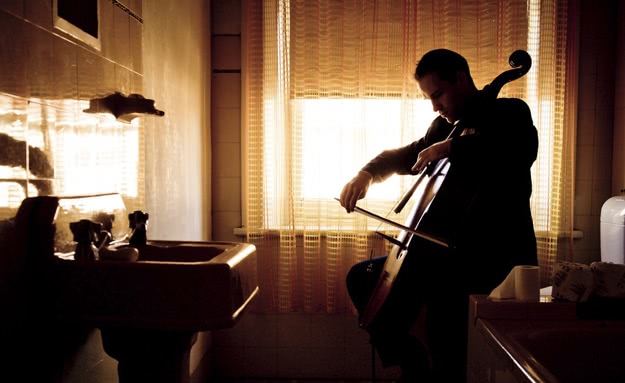With a name like Psycho Strings, you’d be disappointed to walk away from this unusual musical ensemble without having brushed against the macabre. Arguably the most famous classical cue put to film, Bernard Hermann’s searing, stabbing strings in Hitchcock’s masterpiece are still resounding half a century later. Now, coupled with Sam Dobson (AKA Shazza-T)’s hip hop narrative of a Sydney meth dealer’s last day on earth and the dark genius of composer BélaBartók, Chris Pidcock is poised to deliver a performance quite unlike any other.
“You see so many concerts where all you get are these entrees,” Pidcock explains, “All these contrasting pieces. So what I wanted to go for was this dark, almost depressing concert. To show the most brilliant examples from very different genres, but have a theme that brings them all together. And that theme is, well, that there’s really nothing light about it. It’s all about the darkness.”
For a program that promises crime, horror and madness, Pidcock has called on some of the most disparate but talented performers you could hope to find. From the Sydney Symphony to the hip hop storytelling of Shazza-T, Psycho Strings is conjuring a wide palette of inspired unease, not least of which is the addition of controversial composer BélaBartók.
“It’s a great opportunity for us to delve into a wider repertoire. Georges Lentz is the first violinist, and happens to be one of the most renowned composers in Europe and Australia. And then we have Sam Dobson’s hip hop excerpts, who’s also a trained double bass player from the Sydney Conservatorium. We all respect each other’s careers, and don’t see a real difference other than it’s a bit of a test to play hip hop as a classical musician. Sticking to the beat, the syncopations. We tend to lean on the expressive side, whereas this is all about keeping really rigid and making really tight sounds – having a bit of edge.
“The Bartókwe’re using is called String Quartet #4, which sounds quite nice but is really more like some gruesome murder scene. He wrote operas and ballets that were banned in his time because they were considered so violent. The Miraculous Mandarin is about a Mandarin gentleman walking the streets who is seduced by a dancer, but there’s a gang of guys waiting to rob him nearby. They hang him, but every time they try to kill him he just keeps coming back to life. Bartókreally wasn’t afraid to go for these bleaker story lines and images, he was really the bad boy of Hungarian classical music,” Pidcock laughs.
Such shocking imagery hardly seems fitting with classical music. Yet in an age where every video screen seems to depict some level of gratuitousness, one still needs to look no further than classical music for stories of such bloodshed and chaos that even Quentin Tarantino would blanch. Keeping an audience engaged, Pidcock feels, is best achieved by ratcheting up their uncertainty.
“Audiences should never feel truly comfortable. Whenever I put on a concert, I really hope to challenge what the traditional experience is. You shouldn’t be sitting there in comfort, you should be shocked and challenged, you should be seduced by something unexpected. It should never be a cheap joyride, and it should never, ever be a kind of narcotic. It’s important to make it a memorable experience. And sometimes that means upsetting some people, but you inspire new ideas and gain new fans as a result. I get excited by that. I hope we get conflict. I hope that people are challenged.”
Psycho Stringsperform atFoundry 616 onThursday April 16.


































